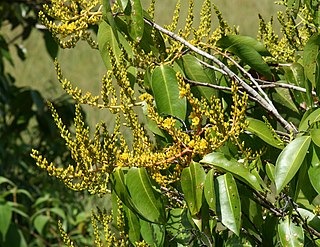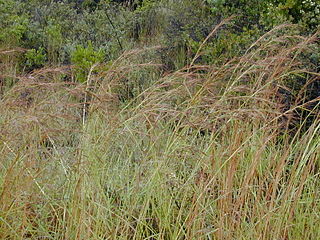
The African palm swift is a small swift. It is very similar to the Asian palm swift, Cypsiurus balasiensis, and was formerly considered to be the same species. The Malagasy palm swift was also recently split from this species. This is a common species with a very wide distribution which faces no obvious threats and may be increasing in numbers as a result of the cultivation of the exotic Washington palm, so the International Union for Conservation of Nature has rated its conservation status as being of "least concern".

Moloney's mimic bat is a species of vesper bat. It can be found in Benin, Cameroon, Central African Republic, Republic of the Congo, Democratic Republic of the Congo, Ivory Coast, Equatorial Guinea, Ethiopia, Gabon, Ghana, Guinea, Kenya, Liberia, Mozambique, Nigeria, Sierra Leone, South Sudan, Tanzania, Togo, Uganda, and Zambia. It is found in subtropical or tropical dry, moist, montane, or mangrove forests and in savanna.

The tiny serotine is a species of vesper bat. It is found in Benin, Burkina Faso, Cameroon, Central African Republic, Chad, Republic of the Congo, Democratic Republic of the Congo, Ivory Coast, Ethiopia, Gambia, Ghana, Guinea, Guinea-Bissau, Nigeria, Senegal, Sudan, Togo, and Uganda. Its natural habitats are savanna and subtropical or tropical shrubland.

Kemp's gerbil is a species of rodent. Mammal Species of the World considers G. kempi and G. gambianus to be synonyms, however the IUCN has assessed each taxon as were they different species.
Bobgunnia fistuloides, synonym Swartzia fistuloides, is a species of legume in the family Fabaceae. It is native to west and west-central tropical Africa.

Arthroleptis poecilonotus is a species of frog in the family Arthroleptidae. This adaptable species has a wide range within the Sub-Saharan Africa and is not considered threatened.

The olive-green camaroptera is a bird species in the family Cisticolidae.

The lowland sooty boubou, also known as the sooty boubou, is a species of bird in the family Malaconotidae. It is found in Angola, Benin, Cameroon, Central African Republic, Republic of the Congo, Democratic Republic of the Congo, Ivory Coast, Equatorial Guinea, Gabon, Ghana, Guinea, Guinea-Bissau, Liberia, Nigeria, Sierra Leone, South Sudan, Togo, and Uganda. Its natural habitats are subtropical or tropical moist lowland forest and subtropical or tropical moist shrubland.

The African shrike-flycatcher or red-eyed shrike-flycatcher is a species of bird in the family Vangidae. It is monotypic within the genus Megabyas. It is found in Angola, Benin, Cameroon, Central African Republic, Republic of the Congo, Democratic Republic of the Congo, Ivory Coast, Equatorial Guinea, Gabon, Gambia, Ghana, Guinea, Kenya, Liberia, Mali, Nigeria, Sierra Leone, South Sudan, Tanzania, Togo, Uganda, and Zambia. Its natural habitats are subtropical or tropical dry forests and subtropical or tropical moist lowland forests.

The copper sunbird is a species of passerine bird in the family Nectariniidae. It is native to tropical Africa, its range extending from Senegal and Guinea in the west to South Sudan and Kenya in the east, and southwards to Angola, Zambia, Zimbabwe and Mozambique.

The chestnut wattle-eye is a species of bird in the family Platysteiridae. It is found in Angola, Cameroon, Central African Republic, Republic of the Congo, Democratic Republic of the Congo, Equatorial Guinea, Gabon, Kenya, Nigeria, South Sudan, Tanzania, Uganda, and Zambia. Its natural habitats are subtropical or tropical moist lowland forest, subtropical or tropical swamps, and moist savanna.

The blue-headed crested flycatcher is a species of bird in the family Monarchidae, native to the African tropical forest.

The yellow-rumped tinkerbird is a bird species in the family Lybiidae, which is native to the moist tropical and subtropical regions of sub-Saharan Africa.

Ouratea is a genus of flowering plants in the family (Ochnaceae). Many genera have been brought into synonymy with Ouratea, including Gomphia.
Thecacoris trichogyne, synonym Thecacoris annobonae, is a species of plant in the family Phyllanthaceae. It is found in west-central and south tropical Africa. It is a shrub or tree and grows primarily in wet tropical habitats.

Hyparrhenia is a genus of grasses. Many species are known commonly as thatching grass.

Anthephora is a genus of plants in the grass family, native to southwest Asia, Africa, the Americas, and various islands.
Polystachya bifida is a species of flowering plant in the family Orchidaceae, native from south-east Nigeria to west-central tropical Africa. It was first described by John Lindley in 1862.
Vincetoxicum cameroonicum is a species of flowering plant in the family Apocynaceae, native from Benin to Uganda in tropical Africa. It was first described by N. E. Brown in 1895 as Tylophora cameroonica.
Synsepalum revolutum is a species of flowering plant in the family Sapotaceae, native to west and west central tropical Africa. It was first described by John Gilbert Baker in 1877 as Sideroxylon revolutum.














